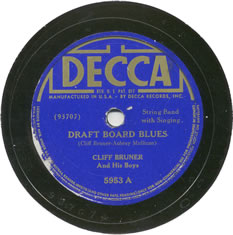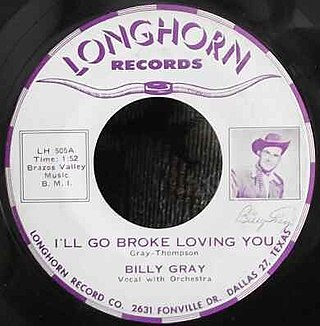Related Research Articles

James Robert Wills was an American Western swing musician, songwriter, and bandleader. Considered by music authorities as the founder of Western swing, he was known widely as the King of Western Swing. He was also noted for punctuating his music with his trademark "ah-haa" calls.

"A Maiden's Prayer" is a composition of Polish composer Tekla Bądarzewska-Baranowska (1834–1861). It was published in 1856 in Warsaw, and then as a supplement to the Revue et gazette musicale de Paris in 1859. It is a short piano piece of medium difficulty for intermediate pianists. Some have liked it for its charming and romantic melody; others have described it as "sentimental salon tosh." The pianist and academic Arthur Loesser described it as "this dowdy product of ineptitude."
The Sons of the Pioneers are one of the United States' earliest Western singing groups. Known for their vocal performances, their musicianship, and their songwriting, they produced innovative recordings that have inspired many Western music performers and remained popular through the years. Since 1933, through many changes in membership, the Sons of the Pioneers have remained one of the longest-surviving country music vocal groups.
Western swing is a subgenre of American country music that originated in the late 1920s in the West and South among the region's Western string bands. It is dance music, often with an up-tempo beat, which attracted huge crowds to dance halls and clubs in Texas, Oklahoma and California during the 1930s and 1940s until a federal war-time nightclub tax in 1944 contributed to the genre's decline.

A Tribute to the Best Damn Fiddle Player in the World is the eleventh studio album by Merle Haggard backed by The Strangers, released in 1970.
"Deep in the Heart of Texas" is an American popular song about Texas.

Clifton Lafayette Bruner was a fiddler and bandleader of the Western Swing era of the 1930s and 1940s. Bruner's music combined elements of traditional string band music, improvisation, blues, folk, and popular melodies of the times.

Thomas Elmer Duncan, was an American Western swing vocalist and songwriter who gained fame in the 1930s as a founding member of The Texas Playboys. He recorded and toured with bandleader Bob Wills on and off into the early 1960s.
"Faded Love" is a Western swing song written by Bob Wills, his father John Wills, and his brother, Billy Jack Wills. The tune is considered to be an exemplar of the Western swing fiddle component of American fiddle.
Lester Robert Barnard, known as Junior Barnard, was an American Western swing guitarist who was a member of Bob Wills and his Texas Playboys. He was among the first electric guitarists to create a guitar effect that anticipated fuzz tone.
Eldon Shamblin was an American guitarist and arranger, particularly important to the development of Western swing music as one of the first electric guitarists in a popular dance band. He was a member of the Strangers during the 1970s and 1980s and was the last surviving member of Bob Wills' band the Texas Playboys.
William Leon McAuliffe was an American Western swing guitarist who was a member of Bob Wills and His Texas Playboys during the 1930s. He was posthumously inducted into the Rock and Roll Hall of Fame as a member of that band, and was a member of the Steel Guitar Hall of Fame.
"Steel Guitar Rag" is the seminal Western swing instrumental credited with popularizing the steel guitar as an integral instrument in a Western band.
"San Antonio Rose" is a swing instrumental introduced in late 1938 by Bob Wills and His Texas Playboys. Quickly becoming the band's most popular number, Wills and band members devised lyrics, which were recorded on April 16, 1940, and released on Okeh 5694 in August as "New San Antonio Rose". Despite having completed a lengthy Hillbilly/Folk chart run in 1939, which culminated at #1, it quickly rose to the top again, in early 1941. It went on to become the band's theme song for the next forty years, reverting to its original title.
"Take Me Back to Tulsa" is a Western swing standard song. Bob Wills and Tommy Duncan added words and music to the melody of the traditional fiddle tune "Walkin' Georgia Rose" in 1940. The song is one of eight country music performances selected for the Rock and Roll Hall of Fame's "500 Songs That Shaped Rock & Roll".

Cecil Lee Brower was a classically trained American jazz violinist who became an architect of Western swing in the 1930s. Perhaps the greatest swing fiddler, he could improvise as well as double shuffle and created his own style which became the benchmark for his contemporaries.

San Antonio Rose is a 1941 American black-and-white musical film starring Jane Frazee and featuring Lon Chaney Jr. and Shemp Howard; it was also designed as a showcase for the then-popular vocal group The Merry Macs. The plot involves two rival groups of entertainers converging on an abandoned roadhouse with the intent to reopen it, unaware that a gangster is eyeing the property for his own scheme.
Westerns swing originated in the 1920s and 1930s; small towns in the US Southwest. Although sometimes subject to the term "Texas swing" it is widely associated with Tulsa, others contend that "Western Swing music finds deep roots in the dust bowl of Oklahoma", and its influences include jazz from the major urban centers of the United States. Its stylistic origins lie in Old Time, Western, blues, folk, swing, Dixieland and jazz. Writing in Rolling Stone, Dan Hicks described it as Texas-bred music grafted to jazz, or as "white country blues with a syncopated beat.".

Longhorn Records was an American country music record label based in Dallas, Texas. The label was founded in September, 1957. Dewey Groom acquired the local Dallas label in 1960 in order to further promote acts that were appearing at the Longhorn Ballroom. Bob Wills made his last recordings with the Texas Playboys for Longhorn in 1964 and 1965. Wills made another session with Longhorn, post Playboys, in which the label allowed Wills to make an album of pure folk music, something Wills had long wanted to do but which had never been supported by any of his previous record labels. One of Longhorn's biggest successes was by Phil Baugh, whose song "Country Guitar" appeared at #16 on the Country singles chart, and the accompanying album reach #4 on Billboard's Top Country Albums. Groom closed the label in 1969 in order to devote more of his energies into the Ballroom.
Alton Meeks Stricklin, better known as Al Stricklin, is an American pianist. Nicknamed "Brother Al" or "Piano Pounder", He was known for his participation in Bob Wills' band Texas Playboys from 1935 to 1942, and performances on several of the band's classic recording, including "New San Antonio Rose", "Steel Guitar Rag", and "Take Me Back to Tulsa".
References
- ↑ 78 Record: Bob Wills And His Texas Playboys - That Brownskin Gal (1940) , retrieved 2021-07-20
- ↑ Russell, Tony (2004). Country Music Records: A Discography, 1921-1942. New York: Oxford University Press. p. 964. ISBN 0195139895.
- ↑ Catalog of Copyright Entries: Musical compositions, Part 3. Library of Congress, Copyright Office., 1941. page 1015
- ↑ San Antonio Rose: The Life And Music Of Bob Wills. Charles R. Townsend. 1976. University of Illinois. p. 344. ISBN 0-252-00470-1.
- ↑ White, King of the Cowboys, Queen of the West, p. 248.
- ↑ Kriebel, Blue Flame, p. 38: "The arrival of Ram Rubinwitch and Herbie Haymer gave the sax section a new look for the band's April 4 session at Decca, where they recorded the ballads 'You Call It Madness,' 'Intermezzo (A Love Story),' Time Changes Everything,' and 'My Mom,' all starring Herman as singer, and 'Lady Rhapsody'."
- ↑ San Antonio Rose: The Life And Music Of Bob Wills. Charles R. Townsend. 1976. University of Illinois. p. 362. ISBN 0-252-00470-1.
- ↑ San Antonio Rose: The Life And Music Of Bob Wills. Charles R. Townsend. 1976. University of Illinois. p. 367. ISBN 0-252-00470-1.